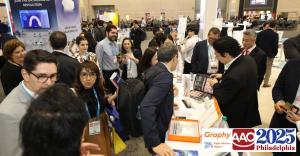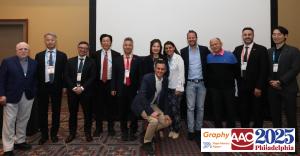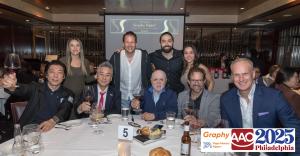Graphy Pioneer a New Era of Orthodontics with Shape Memory Aligner Technology at AAO 2025
Graphy showcases Shape Memory Aligner tech at AAO 2025, redefining orthodontics with clinical strength, global reach, and next-gen digital workflows.
[SMA Technology Featured in Core Scientific Sessions]
Graphy’s SMA technology was prominently featured in over seven official scientific sessions and cited in more than ten major lectures, establishing the company as a mainstream brand at AAO 2025.
Going beyond product demonstrations, these sessions showcased scientific and clinical evidence that Graphy's SMA enables successful treatment of even complex cases—including extraction and re-treatment—without attachments, underscoring a clear clinical advantage over traditional thermoformed or conventional 3D-printed aligners.
[Graphy Night Becomes the Most Attended Brand Event at AAO]
Graphy Night, held during the exhibition, drew more than 130 key opinion leaders, including representatives from leading orthodontic associations worldwide and delegates from the World Federation of Orthodontists (WFO).
It was the most attended brand-hosted event at AAO 2025, reinforcing Graphy's rising global reputation and industry leadership.
Graphy’s exhibition booth also drew the highest foot traffic among participating companies.
Live consultations, demonstrations, and booth lectures consistently attracted large crowds, making it one of the most visible and dynamic spaces throughout the event.
[Strategic Partnerships and Latin American Market Expansion]
At AAO 2025, Graphy strengthened its global alliances with digital dentistry leaders including Medit, Titan, and Formlabs.
Building on its existing presence in Mexico, Chile, and El Salvador, Graphy is now expanding into Colombia, Peru, Argentina, and Uruguay through new dealer partnerships.
This momentum also marked Graphy's official launch in the North American market, representing a pivotal step in the company’s global expansion strategy.
[Strong Global Demand with over 200 Systems Under Discussion]
Graphy’s In-house and Robot-assisted aligner production systems, priced between $10,000 and $40,000 per unit, enable clinics and labs to independently manufacture clear aligners using the company’s proprietary SMA material.
During the show, interest surged from North and Latin American distributors and clinics, with over 200 systems currently under discussion.
This surge reflects the rapidly growing global demand for in-office aligner production powered by Shape Memory Aligner technology.
[SMA Technology Redefines Orthodontic Standards]
Unlike conventional thermoformed or standard 3D-printed aligners, Graphy's Shape Memory Aligner incorporates true shape memory functionality, allowing faster, more precise tooth movement without attachments, even in extraction and re-treatment cases that typically require additional mechanics.
The ability to deliver predictable, efficient outcomes in challenging clinical scenarios clearly sets Graphy apart as a next-generation solution in orthodontics.
[About Graphy]
Graphy Inc. is the global pioneer behind the world’s first directly 3D-printed Shape Memory Aligner (SMA).
Backed by proprietary oligomer-based resin formulation technology, Graphy delivers unmatched precision, predictability, and treatment efficiency.
To date, over 200,000 clinical cases have been successfully treated using SMA, and Graphy now operates in more than 100 countries worldwide.
The company continues to lead the transformation of digital orthodontics through innovative material science and open digital workflows.
Bob Lee
Graphy inc.
+1 888-616-2764
email us here
Visit us on social media:
Facebook
Instagram
LinkedIn
YouTube
Legal Disclaimer:
EIN Presswire provides this news content "as is" without warranty of any kind. We do not accept any responsibility or liability for the accuracy, content, images, videos, licenses, completeness, legality, or reliability of the information contained in this article. If you have any complaints or copyright issues related to this article, kindly contact the author above.
Linda Jasmine Celebrates Women Empowerment at Trina’s Doll Foundation 'She is Everything' Mother’s Day Event
Europe’s Birdwatching Boom Draws New Market Entrants
Alex Rozwadowski Shares Expert Insights on Real Estate Pricing Strategies in 2025
Kalendarium
Więcej ważnych informacji
 Jedynka Newserii
Jedynka Newserii

 Jedynka Newserii
Jedynka Newserii

Handel

Ważą się losy nowej umowy między Unią Europejską a Ukrainą na temat zasad handlu. Obecne przepisy wygasają 5 czerwca
5 czerwca wygasa ATM, czyli wprowadzona przed trzema laty i potem z modyfikacjami przedłużana umowa między UE a Ukrainą, liberalizująca zasady wwozu ukraińskich towarów na teren Wspólnoty. Strona ukraińska chciałaby jej przedłużenia, na razie jednak Unia zgodziła się jedynie na przedłużenie bezcłowego przywozu żelaza i stali. Największe obawy, zwłaszcza w Polsce, budzi kwestia produktów rolnych. Zdaniem europosłanki Konfederacji Anny Bryłki należałoby wrócić do obowiązującej przed 2022 rokiem umowy stowarzyszeniowej DCFTA, ponieważ Ukraina może dziś eksportować swoje towary drogą morską poprzez porty na Morzu Czarnym, a dzięki darmowemu dostępowi do unijnego rynku bogacą się jedynie potentaci rolni.
Ochrona środowiska
Nowe technologie pomagają szybciej i dokładniej sortować odpady. Wciąż nie wszystkie da się jednak przetworzyć

Do 2030 roku 55 proc. odpadów opakowaniowych z tworzyw sztucznych powinno trafiać do przetworzenia. W ubiegłym roku było to ok. 27 proc. Nowe technologie w coraz większym stopniu ułatwiają sortowanie odpadów, ale nie pozwalają jeszcze na przetworzenie wszystkich ich rodzajów. To pierwsze wyzwanie związane z zamykaniem obiegu. Kolejnym jest zwiększanie zawartości materiałów pochodzących z recyklingu w produkowanych opakowaniach, czego wymagają unijne przepisy. Choć w tym obszarze widać w ostatnich latach znaczące postępy, nie brakuje wyzwań.
Handel
Rosyjskie surowce przestaną płynąć do UE. Spóźniony, ale ambitny i istotny plan ma być wdrożony do 2027 roku

– Kupowanie surowców energetycznych z Rosji jest jak kupowanie broni przeciwko Ukrainie – uważa europosłanka PO Mirosława Nykiel. Dlatego KE planuje do 2027 roku ograniczyć do zera import rosyjskich paliw. Joanna Scheuring-Wielgus ocenia, że taka decyzja powinna zapaść już dawno, ale lepiej późno niż wcale. Co więcej, państwa członkowskie powinny być w tych deklaracjach zjednoczone najbardziej, jak się da.
Partner serwisu
Szkolenia

Akademia Newserii
Akademia Newserii to projekt, w ramach którego najlepsi polscy dziennikarze biznesowi, giełdowi oraz lifestylowi, a także szkoleniowcy z wieloletnim doświadczeniem dzielą się swoją wiedzą nt. pracy z mediami.












.gif)

 |
| |
| |
|